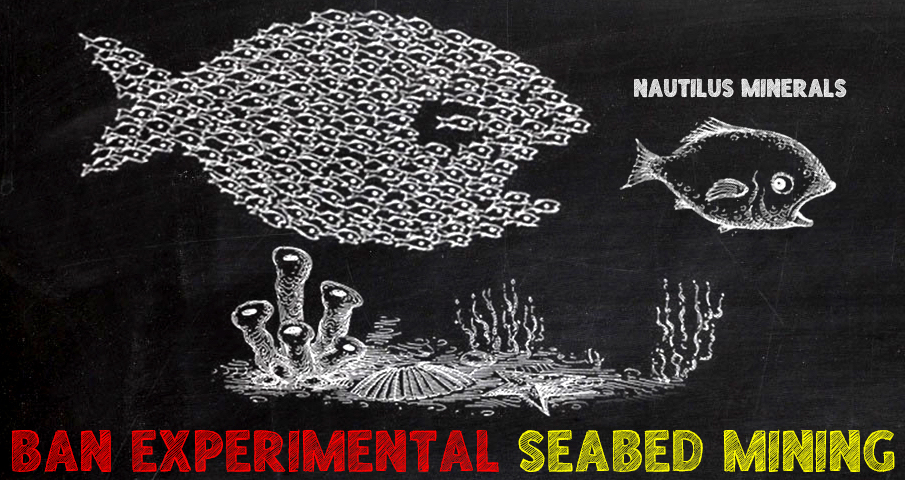
Cartoon: Alliance of Solwara Warriors
The problems just keep stacking up for prospective experimental seabed mining company, Nautilus Minerals, and its planned Solwara 1 mine in Papua New Guinea.
Mining was slated to begin in early 2018, but that date has already abandoned and in the meantime the breadth and volume of opposition just keeps growing.
Over the last few months climate scientists, lawyers, politicians, church leaders, environmentalists, ngos and even the World Bank have all taken aim at Nautilus and Solwara 1 and, with the financial markets running scared, Nautilus doesn’t have the cash to buy a single voice to back their controversial plans.
A recent plea from the Lutheran Church in PNG for greater transparency around the mine approval process and 350,000 signatures from all around the planet opposing seabed mining are just the latest headaches for Nautilus executives.
In April, it was revealed Nautilus has admitted in company documents its mining plans are highly speculative and experimental with no assurances the mining machines will actually work or certainty about the environmental impacts.
This has scared potential investors and Nautilus is desperately short of funds, leading to delays in the production and commissioning of vital mining machinery and its giant support ship. Already Nautilus has announced it will not be ready to start mining in early 2018 as promised and currently it has not been able to provide a new timetable.
In the meantime there seems to be no end to the stream of negative legal and scientific reports casting doubts on the probity of seabed mining.
In June, a new scientific report from the University of Oregan revealed seabed mining could have catastrophic climate impacts while other scientific research is revealing the proposed mining sites are ‘bursting with rare marine species’.
In PNG, the Constitution Law Review Committee has questioned plans for ESM. While, in June, law firm Blue Ocean Law and PANG published a report detailing the risks and pitfalls of deep sea mining, based on an independent legal and policy analysis of the legislation of 14 Pacific Island nations, and in-depth case studies in Tonga, Papua New Guinea, and Fiji.
To make matters even worse for Nautilus, its mining plans are becoming politically toxic in PNG.
Prominent former Attorney General and Madang Governor, Arnold Amet, has spoken out against the proposed mining; the Leader of the Opposition has attacked the government over ESM on the floor of Parliament and people’s champion, MP and Governor Gary Juffa, continues to vocally oppose the mining.
With a National election looming in 2017, the political voices opposing the mining are expected to grow both in number and volume.
In May, the campaign against Nautilus and Solwara 1 was taken onto the international stage with a civil society protest outside a Seabed Mining Summit in London.
Research published by the University of Washington says the proposed Solwara 1 mine could have “a large impact on local fishing” which families rely on for their food and incomes.
National Geographic Society Explorer, Dr Sylvia Earle has branded plans for experimental seabed mining as an ‘invisible land grab’ that threatens ‘wholesale destruction’ and ’a serious threat to the stability of ocean systems’.
Even the World Bank has urged the Pacific to be cautious over seabed mining while Mexico has recently rejected a proposed sebed mine citing environmental concerns.
With so many different national and international voices coming from so many different perspectives in opposition to experimental seabed mining; no voices in support; and Nautilus incapable of mounting a response, maybe, for once, common sense might prevail and Solwara 1 could be dead in the water?
- ACTNOW's blog
- Log in to post comments
